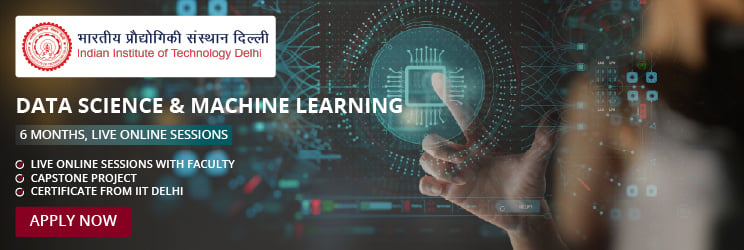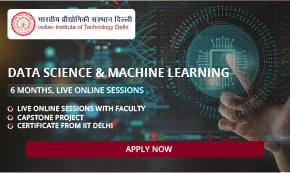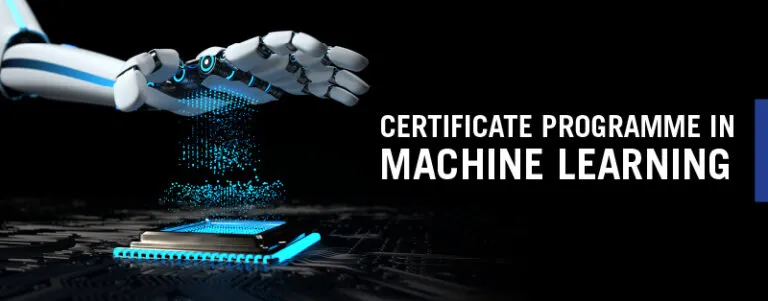What is the Future of Data Science and AI?

- What is Data Science?
- What is Artificial Intelligence?
- What are the Benefits of Integrating Data Science and Artificial Intelligence?
- Future of Data Science
- Future of Artificial Intelligence
- Advancements in AI Technology
- AI’s Impact on the Job Landscape
- Ethical Considerations in AI
- How to Develop a Career in Data Science?
- How to Develop a Career in AI?
Too often, companies focus on innovation and automation at the expense of efficiency and productivity. However, the wide use of data science and AI programmes allows businesses to maintain a balance between them. Data science and AI applications have introduced a standardized process of completing business functions within less time and more efficiently. Moreover, it has sunk deep into the organization’s roots by becoming active in decision-making, customer interaction, product innovation, market research, and marketing strategies. This article will trace the future of data science & AI, emphasizing trends that will rule the industry in the next decade.
What is Data Science?
Data science is the process of extracting raw and unstructured data, combining scientific methods and mathematical formulas, and turning them into structured and filtered data. It uses various tools and techniques to uncover business insights and turn them into actionable solutions. Data scientists, engineers, and executives perform steps like data mining, data cleansing, data aggregation, data manipulation, and data analysis, among others.
What is Artificial Intelligence?
Experts define data science as an interdisciplinary field that uses scientific methods, processes, algorithms, and systems to extract data. Meanwhile, they define artificial intelligence as the theory and development of computer systems that can perform tasks that normally require human intelligence. Artificial intelligence is the subset of data science that is often considered the proxy for the human brain. It uses intelligent and smart systems to offer business processes automation, efficiency, and productivity. Here are some of the real-life AI applications:
- Chatbots
- Voice assistance
- Automated recommendations
- Language translations
- Image recognition
The use of data science and artificial intelligence in companies can help them achieve the unthinkable. It can also trigger automation and efficiency in processes that require more workforce and man-hours. Therefore, many industries have incorporated data science and artificial intelligence, which are reaping the benefits that we will be discussing in the next part of the article.
What are the Benefits of Integrating Data Science and Artificial Intelligence?
Data science and artificial intelligence influence various aspects of society- from grocery shopping to commuting on public transport; everything is evolving since the integration of data science and AI. Below, we enlist some of the benefits triggered by the integration of data science and artificial intelligence.
- Automation of intensive human tasks has helped the workforce to concentrate on other functions.
- Increases efficiency and productivity in Healthcare, Insurance, Pharma, Marketing, and other industries.
- Innovation systems to interact with customers and gauge their requirements.
- Forecasting disasters and preparing for them beforehand.
- It leads to a reduction in human errors.
Future of Data Science
The future of data science is believed to witness some of the biggest innovations seen in the last decade, starting from the data explosion to the growth of the internet of things (IoT) and social media. Experts predict that in the next decade, the rise of machines with lead to the growth in usage and utility of computer systems and mobile devices.
Furthermore, experts also claim that social media use will substantially increase with users consuming numerous amounts of data online. Customers will be using social media for entertainment, transactions, surveillance, etc. Machine learning algorithms will also see a steep rise estimates some experts.
AI Integration
AI incorporation for advanced predictive modeling and decision-making.
Ethical Data Use
Focus on responsible and transparent data handling.
Automation and Efficiency
Increased automation streamlining data processing, freeing up for innovation.
Interdisciplinary Collaboration
Collaboration with diverse disciplines enriching data science projects.
Edge Computing
Utilization of edge computing for real-time analytics in IoT applications.
Predictive Analytics
Advancements enabling accurate anticipation of future trends and behaviors.
Data Privacy & Security
Stricter measures and innovative encryption techniques for data protection.
Continuous Learning
Ongoing commitment to learning for staying updated on evolving trends.
In summary, the future of data science is characterized by the integration of AI, a heightened focus on ethical data use, increased automation for efficiency, interdisciplinary collaboration, the rise of edge computing, advancements in predictive analytics, a strong emphasis on data privacy and security, and an ongoing commitment to continuous learning. These trends collectively contribute to a dynamic and evolving landscape in the realm of data science.
ALSO READ: Thrive as a Data Scientist in India With These Top 7 Skills
Future of Artificial Intelligence
Artificial intelligence is an emerging industry that is turning out to be a proxy for the human brain. It performs various business functions without human intervention like customer interaction, creating brand awareness on social media, etc. Many experts believe that AI can beat humans in almost every cognitive task. Artificial intelligence applications are transforming Healthcare, Insurance, Finance, and Marketing sectors by automating various administrative processes like employee or patient record management, conducting market research, and interacting with potential customers, among others.
Now that you are aware of the future of data science and AI systems, we will look at how to develop a successful career in the respective fields.
AI Integration in Daily Life
AI will seamlessly integrate into daily life, impacting various aspects such as smart homes, healthcare, and personal devices. Virtual assistants, predictive algorithms, and AI-driven services will enhance convenience and efficiency in everyday tasks.
Enhanced Personalization
AI will revolutionize personalization, tailoring services and products to individual preferences. From content recommendations to personalized marketing, AI algorithms will create highly customized experiences for users.
Smart Automation in Industries
Industries will witness extensive integration of smart automation powered by AI technologies. From manufacturing to logistics, AI-driven automation will optimize processes, improve efficiency, and reduce operational costs, marking a transformative shift in industrial practices.
Advancements in AI Technology
Advancements in AI technology are reshaping the landscape of innovation, with two notable pillars driving significant progress.
1. Deep Learning and Neural Networks
This paradigm shift allows machines to learn intricate patterns and representations, mirroring human cognition. Deep learning algorithms, inspired by the complex structure of the human brain, enable more sophisticated data processing, enhancing image recognition, language understanding, and complex decision-making.
2. Evolution of Natural Language Processing
The evolution of Natural Language Processing (NLP) has revolutionized human-computer interactions. AI’s ability to comprehend, interpret, and respond to natural language has reached new heights, facilitating seamless communication between humans and machines.
From chatbots to language translation, NLP advancements contribute to more intuitive and user-friendly AI applications, fostering a future where technology comprehends and communicates in a manner closer to human understanding. Together, these breakthroughs in deep learning and NLP signify a transformative era in AI, unlocking unprecedented possibilities across various domains.
ALSO READ: Beginner’s Guide to Data Science: Learn How to Use Data to Make Informed Decisions
AI’s Impact on the Job Landscape
The integration of Artificial Intelligence (AI) into industries has reshaped the job landscape, introducing both challenges and opportunities.
Rise of AI-Centric Roles
As AI technologies become integral to business operations, a surge in demand for AI-centric roles is evident. Jobs such as AI specialists, machine learning engineers, and data scientists are on the rise, reflecting the need for professionals with expertise in developing, implementing, and managing AI systems.
Skillsets for the AI-driven Economy
The AI-driven economy places a premium on specific skill sets. Proficiency in data analytics, machine learning, and programming languages is increasingly essential. Additionally, adaptability, critical thinking, and creativity are highly valued as organizations seek talent capable of leveraging AI technologies to drive innovation and problem-solving. Navigating the evolving job landscape necessitates a commitment to continuous learning and upskilling to stay competitive in the AI-driven economy.
Ethical Considerations in AI
As AI technologies continue to evolve, ethical considerations have become a focal point, guiding responsible deployment and development practices.
Ensuring Fairness and Accountability
Addressing concerns related to bias and fairness is paramount in the ethical implementation of AI. Efforts to ensure unbiased algorithms, transparent decision-making processes, and accountability mechanisms are crucial to mitigate potential social and ethical implications.
AI Ethics and Regulatory Frameworks
The evolving landscape of AI ethics is accompanied by the establishment of regulatory frameworks. Governments and organizations are actively working on guidelines and policies to govern the ethical use of AI, promoting transparency, privacy, and responsible AI practices. The convergence of ethical considerations and regulatory frameworks aims to strike a balance between innovation and the ethical implications of AI technologies.
ALSO READ: An 8-Step Guide to Responsible AI: Key Ethical Issues and Steps to Overcome Them
How to Develop a Career in Data Science?
Companies are sitting over a mine of data and converting them into an actionable solution. They are employing data scientists. The need for a skilled and talented data scientist increases with each passing day. Suppose you want to develop a long-term career in data science; here are some prerequisites you need to consider.
- Undertake a bachelor’s or master’s degree in data science or a similar field. In addition, candidates can take up different certification or diploma courses to brush up on their data science skills and expand their knowledge of different concepts.
- Hone technical and soft skills like database management, coding languages basics, analytical tools, communication skills, data intuition, and strong business acumen.
- Take up internship opportunities in firms to learn how to translate classroom knowledge to the practical world.
Due to the increasing demand for data science professionals, the job opportunities in the field are abundant. Besides data scientists, here are data science job titles that will be trending in 2022:
- Data analyst
- Data engineer
- Business intelligence analyst
- Marketing analyst
How to Develop a Career in AI?
There are abundant artificial intelligence opportunities due to the widespread use of AI applications in different industries. So, a career in AI looks promising. Here are some of the trending AI job titles:
- Big data engineer
- Machine learning engineer
- Research scientist
- AI data analyst
- AI engineer
Suppose you plan to make a career in AI and take up business analytics courses online to help you hone the skills required to perform complex AI and data science-related tasks efficiently. Emeritus India has some of the best business analytics courses online with renowned Indian and international educational institutes. Therefore, to develop a prosperous career in AI and data science, enrol in our business analytics certification courses.







